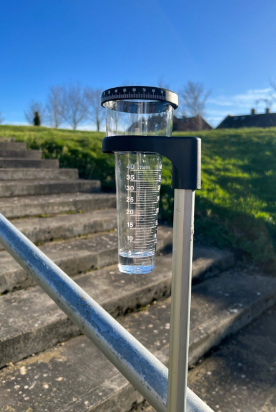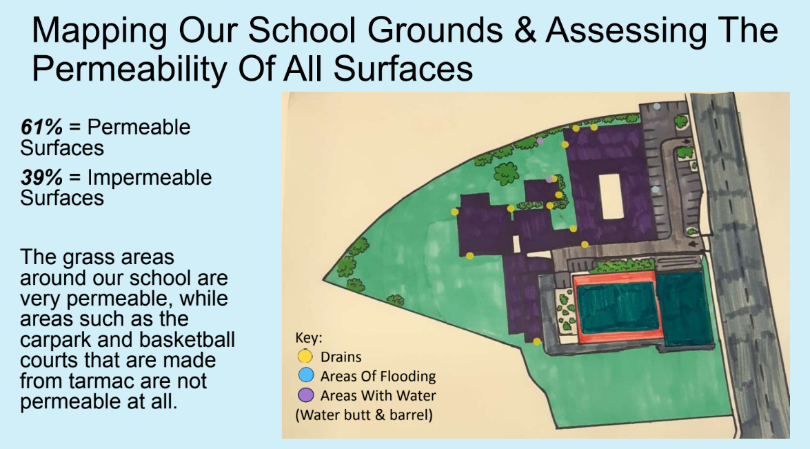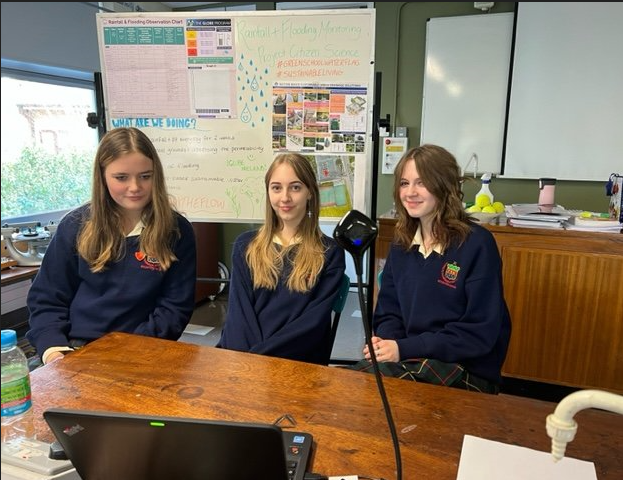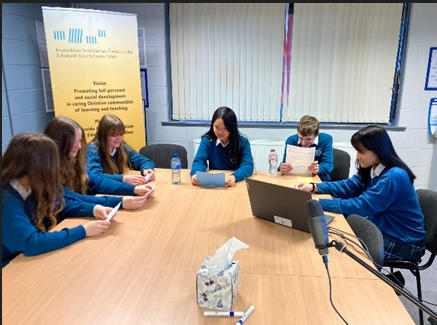Stars and STEM Stories
20 Irish Schools Investigate Rainfall and Flood Resilience in New GLOBE Ireland Climate Education Initiative

Between 9-27 January, 2023, twenty schools across Ireland took part in a new GLOBE Ireland Observation Project titled ‘How Spongy is Your School? Rainfall and Flood Resilience Investigation’.
The students were in charge of recording rainfall and pH using the GLOBE precipitation protocol daily for two weeks, and in the third week, developed school solution suggestions in creative ways. Following the three-week observation and planning period, students were encouraged to try to implement their Spongy School Proposals.
Each school was sent a rain gauge, a measurement observation chart, a land cover classification sheet, and resources on nature-based sustainable urban drainage solutions (NB SUDS). After the first week, students heard from flood resilience practitioners in an expert webinar.
One brave GLOBE Netherlands school joined the observation period so the Irish and Dutch students could get more insights into differences in water management and resilient rainwater solutions. Students especially enjoyed learning about the differences in rainfall patterns and flood protection solutions.
The students who participated:
- Investigated and compared how local precipitation patterns are reacting to climate change by comparing their rainfall observations for January to Met Eireann’s past rainfall data and comparing their results with other Irish Schools from across the country.
- Mapped their schools' land cover to identify the percent of permeable and impermeable spaces on school grounds and map ponding, drainage, vegetation, and consequent possible flood risk zones.
- Studied and explored the suitability of school-based, nature-based sustainable urban drainage solutions for flood resilience. On January 16th, students were invited to an expert panel where they heard from four experts: a Hydrometeorologist in Met Éireann’s Flood Forecast Division, the head of the Office of Public Works Flood Risk Management Unit on Climate Adaptation and Strategic Assessments, the Lead for NB SUDS Local Authority Waters Programme, and a Water Engineer and Professor in SUDS.
- Analyzed their results and developed a ‘spongy school proposal’ that was shared at a virtual student sharing event on January 27th where 15 student groups presented their findings. The students were joined by a number of experts representing universities, NGOs, and local government who asked questions and provided ideas and suggestions for how students could improve their plans or continue their investigations.

Participating teachers offered their thoughts about the project:
“My students and I really enjoyed taking part in this citizen science project, acting like real scientists, collecting real, relevant, important scientific data. We are a Green-School and developing strategies to improve our sustainability is very important to us. I found it very interesting and stimulating as a teacher.”
“The students are learning about climate change and impacts in a local context and thinking through the solutions they can put in place. That's really powerful. The students who worked on the presentation loved working together on the project. It has spurred them on to do further work.”
“The resources that were sent were easy to use, especially the rain gauge. A conversation started about the weather event that happened in our own area in 2009-10 and we were visited by a local councilor who told us about the devastation that this caused. The project therefore brought together strands from Maths, English, History and of course Science and Geography.”


Students also reflected on their experiences:
“I love the practical work the most, going outside and measuring the rainwater with a rain gauge was really fun to do. Also creating solutions that can benefit my school and environment around me.”
“I enjoyed presenting our information at the end to other schools. I also got to see what other schools were planning on doing with their resources and information. This also helped us to get better ideas. We had the idea of getting water butts to collect the water running out of the gutters and use this water for our garden. We were also thinking of getting a living roof which would be to plant different plants on to a roof to absorb any rain falling on the roof.”
“I enjoyed the team spirit of everyone working to improve our community's flood resistance. I want to work in some area of science when I finish school so this was a great way to find out what it would be like.”
“I feel like we should really get more schools to try do this as well and maybe other schools could be more sustainable “
“I most enjoyed exploring creative solutions for rainfall conservation.”
“The part I most enjoyed was going out of the school and analyzing puddle locations and sizes. This helped us see where we needed to put swales or drains for our school. I think we should plant as many plants as we can where we can, use permeable paving instead of tarmac, put potted plants in the center of outside tables and install green roofs.”
The success of the project and quality of student work was recognized by the Climate Action Regional Office and the Local Authority Waters Programme in Ireland who provided a 500-1000 EUR prize fund for six of the participating schools to implement their nature-based 'spongy school' solutions on school grounds.
This new pilot thereby showcases how GLOBE Protocols such as precipitation and land cover can contribute to climate action at school while building climate literacy competencies for teachers and students alike!
GLOBE Ireland anticipates next steps to replicate the pilot in the 2023-24 school year with a new cohort of schools.





